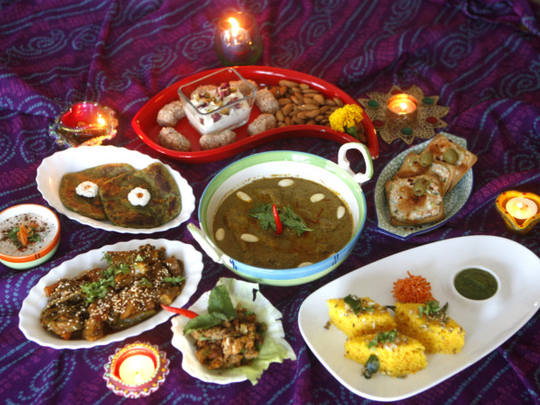
When we speak of Diwali, the first thing that comes to mind, after lights, is indulgence. Unlike Christmas or Eid where festivities are restricted to a day or two, Diwali celebrations begin with Dassehra, 20 days before the actual date. From syrupy sweet desserts (which actually are on top of the menu), to fried savouries and exotic kormas and koftas, there is no set menu for this indulgence.
However, Pooja Makhija, nutrition consultant to Bollywood stars such as Deepika Padukone and Preity Zinta, and writer of Eat. Delete. feels the indulgence need not be a bad one.
“Yes, Diwali is a time to eat, drink and be merry. But we can enjoy the festivities without burdening our sugar or triglycerides levels or worrying about cholesterol,” says Makhija. “I’d say be different this Diwali. It doesn’t need to be a period when you fill up yourself or your guests with sugar and fat. Be innovative — you can make so many healthy starters that are as tasty as fried ones, yet not as taxing on the body. If you want biryani, do a quinoa biryani. Everyone loves the real thing but you will have added thought for your guests’ health because they are important to you”.
“During Diwali we visit so many people and food is always an important part of it. So, you prefer to eat light as you want to feel light and good rather than stuffed,” says Gahana Khatwani a homemaker who helps family and friends learn cooking.
Khatwani, who won the Sadia UAE Ramadan Cooking Challenge 2012 organised by Food Food Channel in July, advocates cooking healthy in all her sessions. “We’ve grown up eating these dishes cooked with lots of ghee, butter, cream and sugar — and served with fried bread. However, people are now more health conscious and though they want to have tasty and interesting food, they limit traditional Indian food. So I adapt traditional recipes into healthy ones.”
However, there is no Diwali without sweets. From lush malpuas (pancakes) dripping with rabri (thickened sweet milk) to myriad burfis, laddoos and halwas, sweet shops start preparing these weeks in advance.
“When we think dessert, we think we are just having sugar. All desserts are sugar plus fat. It will have ghee (clarified butter), khoya (thickened milk) and malai (cream) along with sugar, sweetener or gud (jaggery),” says Makhija. So if I can at least eliminate the sugar, then excellent. If I can prepare desserts which are low-fat and sugar-free, even better. I don’t believe in using sugar substitutes on a daily basis but yes at this time, it’s far better to have dessert with sweetener rather than the fat and the sugar also. However, we must know that indulgences are not necessarily all sugar-based.”
Makhija says there are other ways to add pizazz to your celebrations rather than with just food.
“Add the zing in the way you present it rather than let the food represent it. I’ll serve my guests an array of healthy starters, say a cracker topped with sautéed mushrooms, egg white and Dijon mustard but served in a red tray with tea lights or diyas and flowers. You have a humble starter but presented so well the guest cannot but enjoy it.
“Diwali is a festival that has to be enjoyed more with colour, festivities and light, rather than by taxing our body with calories and fat”.
Box: Tips to balance
“No one is saying that anybody should be deprived. But we need to note every indulgence. We need to be super good and watch our intake throughout the day if we have a celebration later in the evening,” says Pooja Makhija.
- Eat light meals all day.
- Save on your meat quota or protein quota for later.
- Be zero-oil at the time you are trying to be good. Save up on your oil and fat quota. Because our fat quota is going to go up in the course of the day for it is Diwali and there’s a lot of fried temptation around.
- If you are a person who exercises for 60 minutes, up it to 80. If you exercise for 30 minutes, up it to 60. So whatever exercise you do every day, if you increase by 20-50 minutes each day, you will increase the outcome in the day and the balance of the entire calorie intake through the day can be maintained.
- Eat in the first hour of the rising — that’s the best way you can activate your internal gym. So that whatever cheating or indulgence you do during the week can be burnt out.
- Try not doing lunch and dinner outside on the same day. Be in control.
- Have a glass of vegetable juice everyday. We should also be shining like the lights of Diwali. Take a minimum of three different coloured vegetables for the juice and slurp it down immediately. Avoid pre-packed store bought ones.












